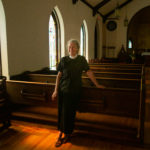Women do incredible things. Here, we feature the stories of women who are a part of the Southeast Missouri community by way of living here, being from here or passing through. We hope these stories inspire you to connect with others and that they encourage you to be who you are in the world. We need you and your unique gifts.
This story was first published in the August 2019 issue of “The Best Years (TBY).”
When Connie Blechle steps into one side of her barn just outside of Perryville, Missouri, 15 heads turn her way. It’s Artie, Magic, Sonic, Boomer, Hunk, Cal, Rocky and Bullwinkle. It’s Fiona, Easter, Miracle, Gucci, Trixie, Maybelline and Cookie. The attention of each of Blechle’s suri alpacas is on her, as she talks with them and they come to the fence to sniff her hand, showing her their love.
Blechle bought her first alpaca in 2007, after learning about them from television and wanting to make items from their fiber. Of the two breeds of alpacas, she gravitated toward the suri alpaca specifically because she loved their long locks and thought the bangs hanging in their face were “just so cute.” From there, her farm — called Breezy Ridge Alpacas — was born.
“I just love whenever I come down of a morning, and they’re all so happy to see me,” Blechle says. “They know what time it is, they know the routines we have. … They’re just cool. They’re kind of calming. … They’re just there, and they’re happy to have you take care of them.”
Taking care of the animals is only half of Blechle’s story, however. On the other side of the barn is Blechle’s studio, where she spins the alpaca’s fiber into yarn and also knits hats, scarves, gloves, socks and a variety of other items. She spins the fiber on her double-treadle Majacraft rose spinning wheel from New Zealand, which she purchased from a friend.
Creating those knitted items is a long process: first, the alpacas are sheared, and any debris in their fiber, such as hay, is sorted out. If Blechle is sending it to the mill to be processed, she then weighs, labels and bags it before shipping it off. If she processes the fiber herself, she washes it and either leaves it as its natural color or dyes it with acid dyes. She then cards it with her motorized drum carder, a machine that causes the fiber to hold together while blending it with sheep’s wool. Blechle sometimes adds some fine wool in to help the slick suri alpaca fiber retain its shape when it becomes a knitted item like a hat.
Once it has been carded, the fiber holds itself together as batting, and Blechle peels it off in thin strips into roving. She then puts it on her spinning wheel, using the treadles with her feet to make the wheel spin. Her back hand — called the drafting hand — pulls fiber from a bag on the floor and holds it steady while her front hand controls the twist of the fiber as it spins on the wheel. Voilà — the fiber becomes yarn that can be knitted by hand or with a machine into a scarf, hat, gloves or any other item Blechle feels like creating.
Blechle taught herself how to spin fiber and has learned process techniques from attending workshops and classes. She sells the items she makes on her Etsy shop and also at the Best of Missouri Market once a year at the Botanical Gardens in St. Louis and at wool festivals. She also sells long locks, which are longer, unprocessed pieces of alpaca fiber, to other fiber artists and crafters.
In addition, Blechle teaches a course about a fiber-related topic each fall at Fiber-U in Lebanon, Missouri, and at Ozark Fiber Fling in Steelville, Missouri. She has also written a children’s book about the process of shearing, dyeing and spinning alpaca fiber and then making it into a wearable item.
Raising alpacas and creating products from their fiber is a family affair: Blechle first learned how to crochet when she was 15 from her late mother-in-law, before she was Blechle’s mother-in-law. In addition, when Blechle’s daughter-in-law, Jamie, was still her son’s fiancée, she helped Blechle nurse Miracle, the first alpaca born on Blechle’s farm, back to life. Now, Jamie and Blechle’s son, Brandon, have Shetland sheep; Jamie knits with their wool.
“It’s calming, once you learn it,” Blechle says of spinning fiber. “It’s relaxing, and it’s fulfilling because you made an item, you made a product out of their fiber from start to finish. That’s what’s so cool.”


1 Comment